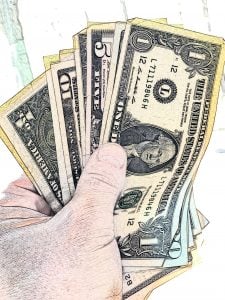 A significant 92% of consumers given Earned Wage Access (EWA), a service that allows people to get paid as they earn, said that it helped them to settle bills on time, “avoid overdraft fees and payday loans, and become less dependent on credit cards – empowering them to achieve at least one of their financial goals in 2020.”
A significant 92% of consumers given Earned Wage Access (EWA), a service that allows people to get paid as they earn, said that it helped them to settle bills on time, “avoid overdraft fees and payday loans, and become less dependent on credit cards – empowering them to achieve at least one of their financial goals in 2020.”
According to a survey from FTI Consulting, consumers experienced “less-stress” and improved financial and emotional health “with the help of EWA.”
The research study, carried out by Earnin with sevearal industry partners, determined that “breaking the traditional two-week pay cycle gives workers the tools they need to manage their finances, and found that without EWA, 44% of users would otherwise consider not paying certain bills and more than one-third of consumers would deliberately overdraft or use a payday loan.”
“Financial empowerment and building a more equitable financial system starts with ending the traditional paycheck cycle,” stated Ram Palaniappan, Founder and CEO at Earnin, an Earnged Wage Access provider that specializes in developing products for an equitable financial system.
Ram added:
“This data confirms what we hear everyday from our users: giving people access to their paycheck helps them pay bills on time and avoid overdraft fees, payday loans, and reduce reliance on credit cards.”
The study of 4,735 earned wage access clients aims to gain a better understanding of how consumers use and “benefit financially from Direct to Consumer (D2C) Earned Wage Access services that provide people access to their income soon after they earn it.”
As stated in an update shared with CI:
“Overall, the study found that by receiving access to their wages through EWA services, consumers felt more in control of their finances and experienced better financial well-being. The majority (roughly 88% of respondents) believe that having access to their wages as they earned them during the pandemic was essential to their financial well-being.”
Additional findings are as follows:
- 92% of EWA consumers “felt that the service helped them to achieve at least one of their financial goals in 2020, which were to pay bills on time, avoid overdraft fees and payday loans, and become less dependent on credit cards.”
- An “overwhelming majority of consumers (91%) said they understand how the EWA service works and understand the associated fees (89%).”
- A strong majority of EWA users “reported a boost in their overall well-being after using the service.” Eight in 10 “reported feeling less stressed about their financial situation (82%), having higher self-esteem (81%) and an improvement in their mental health (77%).”
- Without access to an EWA service, 44% would “consider not paying certain bills on time, 38% would consider going into overdraft and 35% would consider using a payday loan.”
- The majority of respondents (60%) “reported that they do not have tools from their employer to better control their finances.”
When it comes to better understanding earned wage access users, the study found that “half are non-white and the majority are Millennials aged between 25-40.”
The average annual household income of users “is $50,700 and more than half have some level of college education.” The update further revealed that the majority of respondents “use EWA every two weeks and access an average of $100-$149 in order to pay bills on time (61%), avoid overdraft fees (52%) and buy groceries (52%).”
This research was carried out online by FTI Consulting’s Digital & Insights team, “on behalf of Brigit, MoneyLion & Earnin.”
Earnin’s goal is to develop products for “a more equitable financial system and a better life.” Built for the unique requirements of people living paycheck to paycheck, Earnin is “designed to free people from the traditional payment cycle and help them take control of their money, starting from when they earn it.”
Earnin’s suite of tools include: Cash Out, which “provides access to income as it’s earned, Balance Shield, a low balance alert to help maintain a positive bank balance, Financial Calendar that helps people budget and schedule payments, and Tip Yourself, an easy way to set aside money to reach savings goals. Earnin is community-supported, with no mandatory fees or hidden costs.”
People tip “what they choose to support the service.” As of September 2021, Earnin has carried out over 125 million transactions and “provided access to $10 billion in earnings for its members.”

